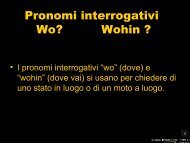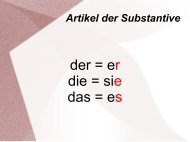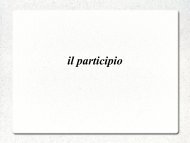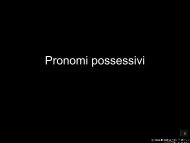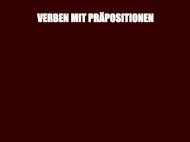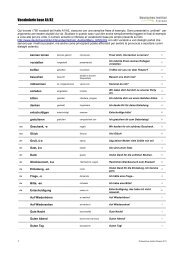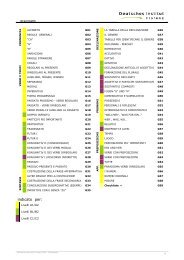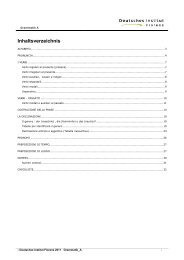Konjunktiv II - Deutsches Institut Florenz
Konjunktiv II - Deutsches Institut Florenz
Konjunktiv II - Deutsches Institut Florenz
- No tags were found...
Create successful ePaper yourself
Turn your PDF publications into a flip-book with our unique Google optimized e-Paper software.
DEMHS NewsMarch 2013Nuts and Bolts emergency trainingMost Vermont communitieshave effective and efficientemergency responders inthe form of fire, rescue, andlocal police. However,there is more cities andtowns can and should do toensure all facets ofemergency response arepresent locally in the eventof a large-scale event.The Division of EmergencyManagement andHomeland Security isassisting towns to set up aframework for emergency preparedness, response, andrecovery with a training called Sustainable All-hazardsEmergency Management Planning: Building a “Nuts andBolts” Capability for Communities.This course is designed for local citizens involved in thedevelopment and sustainment of the municipality’s localemergency management system. This program will addressthe process of identifying and building an effective localemergency management team through engaging thenumerous community resources, people, and localbusinesses. The goal is to further develop the neededsustainable dialogue withneighbors, towngovernment, businesses,and adjacent communities.This interactive trainingexplores the “nuts andbolts” of developing asimple all-inclusive processfor effective emergencymanagement. Townparticipants will collectivelybuild the local capacity forsustainable all-hazardsemergency managementplanning, response,recovery/mitigation, and communications.For more information or to schedule a training session,please contact the Program Facilitators:Robert Schell, robert.schell@state.vt.usBob Weinert, bob.weinert@state.vt.usOr call the Vermont Division of Emergency Management &Homeland Security at 800-347-0488.Randy Bronson retiresRandy Bronson (left with Director Joe Flynn) of the Division of Emergency Management andHomeland Security retired from state service on February 22nd. Randy worked for theDepartment of Public Service for more than 20 years, most recently running the state EmergencyPlanning & Community Right to Know program. Randy plans to become a free-lance consultantfor companies within the programs. He also plans to travel and continue to enjoy all facets ofNASCAR—especially rooting for Dale Jr.4
i verbi modaliichduer,sie,eswirihrSie, siekönntekönntestkönntekönntenkönntetkönntenx© 2006
i verbi modaliichduer,sie,eswirihrSie, siewoll tewoll testwoll tewoll tenwoll tetwoll tenx© 2006
i verbi modaliichduer,sie,eswirihrSie, siesolltesolltestsolltesolltensolltetsolltenx© 2006
il verbo haben (avere)ichduer,sie,eswirihrSie, siehättehättesthättehättenhättethättenx© 2006
i verbi irregolari: sein (essere)ichduer,sie,eswirihrSie, siewärewärstwärewärenwärtwärenx© 2006
• Le forme dei verbi irregolari senza"würden" devono essere imparate, tuttaviasolo passivamente, perché si tratta diforme grammaticali ormai quasi sparitedalla lingua parlata. Il <strong>Konjunktiv</strong> <strong>II</strong> deiverbi regolari è identico al preterito e deveessere sempre sostituito con la forma delwürde + infinito.x© 2006
i verbi regolari: vecchia forma, coincide conil preteritoichduer,sie,eswirihrSie, siemachtemachtestmachtemachtenmachtetmachtenx© 2006
il verbo wissen sapereichduer,sie,eswirihrSie, siewüsstewüsstestwüsstewüsstenwüsstetwüsstenx© 2006
Desinenze verbi irregolari, vecchia formaich ..edu ..ster sie es..ewir ..enihr ..tSie sie ..enx© 2006
• Alcuni verbi irregolari cambiano la radicecome nel preterito• Prima e terza singolare sono ugualix© 2006
i verbi irregolari: kommenichduer,sie,eswirihrSie, siekämkämkämkämkämkämesteentenx© 2006
i verbi irregolari: gehenichduer,sie,eswirihrSie, sieginggingginggingginggingesteentenx© 2006
Nella lingua parlata si usa la forma conausiliareichduer sie eswirihrSie siewürdewürdestwürdewürdenwürdetwürden.....gehen.....fahren.....sein.....essen...verstehen.....arbeitenx© 2006
Il passato del <strong>Konjunktiv</strong> <strong>II</strong> si formacon "wäre" o "hätte" con participiopassato .• Ich wäre gerne gekommen• Er hätte das sicher besser gemachtx© 2006
• Con i verbi modali al passato si mette ildoppio infinito come nel passato normale.• Ich hätte dir das sagen müssen, aberich habe es vergessenx© 2006
Quando si usa il <strong>Konjunktiv</strong> <strong>II</strong> ?• Il <strong>Konjunktiv</strong> <strong>II</strong> corrisponde all' uso delcondizionale in italiano e si usa spessissimo coni verbi modali e nelle forme di cortesia:• "Könnten Sie mir bitte helfen?“• "Ich müsste jetzt gehen“• "Würden Sie bitte wiederholen?"• "Dürfte ich Sie um einen Gefallen bitten?"• "Könnten Sie mir das schriftlich bestätigen?“• " Was würdest du jetzt gerne machen?"x© 2006
• Inoltre si usa nel periodo ipotetico (irreale) con lecongiunzioni "wenn" e "als ob" e bisogna rispettare lacostruzione delle secondarie.• "Wenn ich Zeit hätte, würde ich dir gerne helfen",• "Wenn ich du wäre, würde ich das ganz andersmachen".• "Wenn ich im Lotto gewinnen würde, würde ichzuerst eine lange Reise machen"• "Er tut so, als ob er alles wüsste (wissen würde)"• " Wenn ich das könnte, wäre ich froh".x© 2006
Optativ• Hätte ich doch gewartet!• Wärst du doch früher gekommen!• Hätte ich es ihm doch gesagt!x© 2006
Verbinde in einem Konditionalsatz• Geld haben• mehr Zeit• weniger Geld• Vokabeln lernen• besser aufpassen• wissen• Weltreise machen• Mehr lesen• Bei……. sparen• besser sprechen• Unfall vermeiden• Alles besser machenx© 2006



